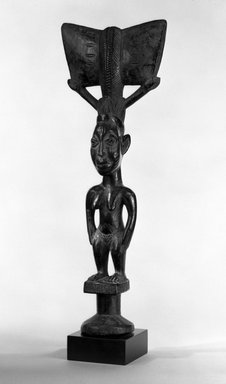
Artist:Yorùbá
Medium: Wood, pigment
Geograhical Locations:
Dates:late 19th or early 20th century
Dimensions: 19 1/2 x 7 x 3 1/4 in. (49.5 x 17.8 x 8.3 cm)
Collections:
Accession Number: 79.27
Image: 79.27_bw.jpg,
Catalogue Description: A dance wand in the form of a standing wooden female figure with arms at sides apart from torso; hands joined at hips; and feet and legs apart. Facial features include a forehead with three vertical cicatrization marks; eyelids heavy and triangular in shape; centers of eyes pierced; and lips slightly apart. Ears are horseshoe-shaped and slightly flared away from head. Coiffure has four overlapping cone-shaped elements with incised striations. Face and coiffure are separated by a smooth band with ties at the back of the head. A large double-edged axe springs vertically from top of coiffure. It is supported on either side by a smaller axe attached to a handle that joins the coiffure. Three leaf-shaped cicatrization marks appear on the front of each axe blade. Central rib of main staff (oshe) has incised geometric designs of diagonal lines and a horizontal-notched pattern on the front and back. Figure is a deep burnished reddish color with traces of red camwood. Coiffure and axe are matte black. Figure stands on its own rectangular base. Below the base is a handle in the shape of a cylinder with a flared circular terminal. Object is mounted on a modern wooden black stand. Condition is excellent. Evidence of wear on handle. Figure has some pitting and surface losses.